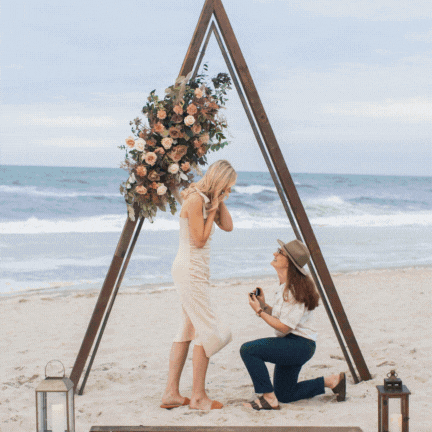By Glenda Corwin, Ph.D.
 Can you believe the Supreme Court is actually going to hear two cases about same-sex marriage? We’ve come a long way! I know we’re nervous about the outcome of the Prop 8 case, but the fact that we even have this to worry about is amazing. The Supreme Court, our national parental transference figures, the ultimate authorities of our legal system, have agreed that this issue deserves their serious attention. Just in time for family holiday dinners!
Can you believe the Supreme Court is actually going to hear two cases about same-sex marriage? We’ve come a long way! I know we’re nervous about the outcome of the Prop 8 case, but the fact that we even have this to worry about is amazing. The Supreme Court, our national parental transference figures, the ultimate authorities of our legal system, have agreed that this issue deserves their serious attention. Just in time for family holiday dinners!
Thinking about why this matters leads to thoughts about why it’s so important to be “normal.” Yes, these cases are about equal rights under the law, about claiming the same rights as our heterosexual cohorts. And yes, I know that marriage does not guarantee lifelong love and security. Just ask our divorced heterosexual friends. But there’s something about being “normal,” especially when you’re around your family of origin. Holiday visits are all about connecting with your tribal roots, and it’s not always good.
Imagine being back in cave-people days, when being “abnormal” could land you outside the cave, facing predators and natural disasters by yourself. Meanwhile, your “normal” peers gather around the fire, protecting each other. Today it may be cool to be “unique,” but back then it was life-threatening. In some ways, I think it still is, especially when you think about emotional survival.
Remember sitting around the holiday dinner table as people launched into catching up with each other (who got married or divorced, what the children are doing, what are the young people up to, etc.)? Remember dreading the question, “Are you dating anyone?” How to answer that?
“Yes, I’m really excited about this woman I met! Maybe I can bring her for a visit next time.” For most of my family, that would be a real conversation stopper.
“Yes, I met someone recently, and it’s going pretty well.” That won’t work, because they’ll want to know who.
“Oh, nothing serious going on….” Well, that will stave off further comments, but it leaves a bad feeling, like you’re a loser who can’t attract a mate, an “old maid” who focuses on her career, not to mention not having a social life. Talk about feeling abnormal, standing alone outside the cave. No glow from these people, and your real tribe, your chosen family, isn’t there, either.
Coming out to the family can stop the dating questions, but then there aren’t many partner questions, either. I might enjoy talking about how wonderful she is, or our plans for next year. Actually, I might enjoy that for about a minute, but the ensuing polite silence brings an outside-the-cave moment, and then it’s not so enjoyable. So there’s the dilemma: Would I rather feel a little guarded but included in the pack, or feel really authentic but excluded, standing outside?
So how can same-sex marriage help with family holiday dinners? In several ways! Talk about bringing in the outside reinforcements: The Supreme Court thinks our case is valid enough to deserve serious attention, so you can take it seriously, too. Not that this is going to be an overt conversation; just the fact that it’s in the news means it’s realer, more prevalent, more normal. So whenever you do show up with an intimate partner, your family will probably have a softer adjustment. They may even welcome him or her, happy that you found someone you love.
Marriage equality can help parents, too. All the folks who have been blaming themselves for producing gay or lesbian offspring can now take a deep breath and let go of some guilt and shame. As it turns out, the children are OK, and there are a lot of others like them. Nothing made them “be that way” any more than Cousin Will made his son left-handed. Not worrying about what you did wrong frees up a lot of energy to enjoy what you did right.
Not being totally naïve, I don’t expect the family dinner discussions to include “Thank goodness we’re about to legalize same-sex marriage!” There may be deeps sighs of the whole-world-is-going-to-hell variety, or even some semi-veiled disapproving looks. Most likely it won’t be mentioned at all. But I’ll still know that they know there are others like me who feel fully respected and valued, just like we value my heterosexual cousins. That we’re actually normal.
Sometimes people say, “You shouldn’t care so much what other people think.” I think caring is the price of being a member of the human race. We’re social animals who depend on our groups to survive, and we get to know ourselves by seeing our reflections in other people’s eyes. What they think has a way of sinking very deeply into our psyches. Some are better than others at shaking it off or countering negativity, but I don’t think anyone totally escapes the impact of negative social judgment. Moreover, it takes a lot of energy to deal with all that internalized heterocentricism. Imagine what we’ll be able to do as that inner weight eases up! Maybe we can channel it into having more intimate partnerships and more authentic relationships with our families, more relaxed fun at family dinners.
Happy holidays to all of us, to the Supreme Court and to our extended families. Our tribe is rising!
Glenda Corwin, Ph,.D. is a clinical psychologist who practices in Atlanta, Georgia. She specializes in sexual intimacy issues for women in same-sex relationships. Her work as a therapist and her research on lesbian sexual patterns inspired her to write Sexual Intimacy for Women: A Guide for Same Sex Couples. Learn more about her practice at drglendacorwin.com.
This article originally appeared on The Huffington Post and is run with the author’s permission.





















